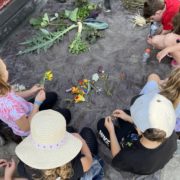Fall 2022 Field Trips: A Recap
Hello Friends and Farmers. Our final Fall 2022 Field Trip was on November 17th. Thank you for another lovely season. It was a delight to be running our program at pre-pandemic capacity.
We ran 24 field trips, serving around 650 students from Portland and Scappoose School Districts, and all but 3 of those trips were funded by scholarship. That’s almost 90%! It was lovely to have our long-standing schools such as Harrison Park, Sauvie Island School, Astor, and Martin Luther King Jr., return and meet new faces from Beach, Warren, and the Cottonwood School. Thank you so much to our partners and donors. We heard over and over again that for many students, this was their first field trip since 2020. For our 1st and 2nd grade classes, some said this was their first field trips ever. Your support makes it possible to teach youth the science behind how our foods grows while developing positive attitudes towards fresh, locally-grown vegetables.
The tomatoes, nasturtiums, calendula, borage, greens, sunflowers, artichokes, and cardoons did well this fall. The favorite autumn garden activities were planting garlic, saving seeds, and spotting frogs. Students were able to take home squash, apples, tomatoes, and shallots courtesy of our site partners, Topaz Farm, and remember the Multnomah People of the Chinook Nation who stewarded the land since time immemorial. When we work with the land, we remember its history, and we are lucky to be on Sauvie Island with its longstanding history of horticulture and agriculture.
Two field trips needed to be rescheduled due to the wildfire smoke in mid-October. Fortunately, we were able to squeeze them in. Thanks to Faubion for your adaptability.
Here’s some feedback from teachers and parents this season:
“They loved it! Even our students who spoke little English enjoyed the hands-on experience.”
“My students were so excited to be here! Some of them have never been to Sauvie Island before so this was a great experience for them.”
“Seeing/interacting with the food life cycle is good for them. Hopefully leading to bettering the environment!”
We’ll see you in the spring!



